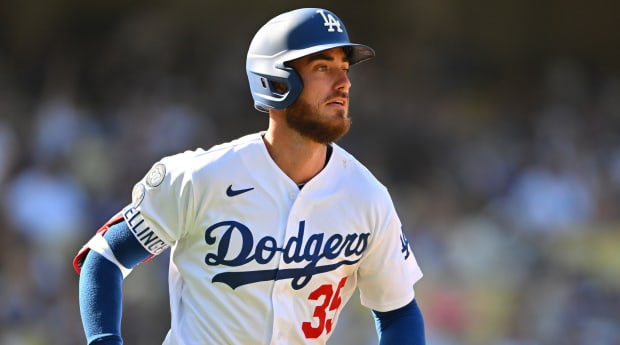It may not have made sense for the Dodgers to spend another year trying to fix their former MVP, but Chicago has little to lose and much to gain by signing him.
In the end, Cody Bellinger got exactly what was coming to him—just from a different high-profile team in a major market.
Less than three weeks after the Dodgers declined to tender him a contract for the 2023 season—which would have been for around $18 million—Bellinger has found a new home with the Cubs, who agreed to a one-year, $17.5 million deal with the former MVP center fielder. The move represents an opportunity for the once-elite player to start fresh and reset his value, while Chicago takes a high-upside gamble on a potentially game-changing offensive piece its lineup so desperately needs.
Bellinger’s rollercoaster of a career has been well documented. From his MLB debut at age 21 in 2017 to ‘19, Bellinger made two All-Star teams, posted a 140 wRC+ and won the ‘19 National League MVP award. His 111 home runs in that span are tied for the 18th-most in MLB history for a player age 23 or younger, ahead of names like Hank Aaron, Joe DiMaggio and Miguel Cabrera. Though injuries hampered him in the shortened ‘20 campaign, he remained productive, and was a key contributor during the Dodgers’ postseason run and eventual World Series title.
Then, everything fell apart. Injuries continued to plague Bellinger in 2021, causing him to miss 67 games. Though he remained strong on defense in center field, his offensive output was a disaster. Bellinger batted .165/.240/.302 over 350 plate appearances, which represented the sixth-lowest batting average for a hitter with that many plate appearances since 1900. He rebounded a bit from that historic low in ‘22, hitting 19 home runs with 14 stolen bases over 144 games, though still posted a meager .210/.265/.389 slash line that the Dodgers ultimately decided was not worth paying $18 million for next season.

Jayne Kamin-Oncea/USA TODAY Sports
But everyone loves a good comeback story, and players of Bellinger’s caliber do not become available too often. The potential is obvious: when healthy, few can impact the game on both sides of the ball like he can. He won a Gold Glove in 2019 in right field and ranked tied for eighth among center fielders in outs above average last season. After injuries hampered him for two years, he made it through the entire year healthy in ‘22, so perhaps a return to form in the batter’s box is the next step. Plus, he’s still only 26 years old.
So what does Bellinger need to do to rediscover his early-career heyday? First and foremost, he needs to solve the riddle of offspeed and breaking pitches. In his peak in 2019, it didn’t matter what pitch type Bellinger saw—he clobbered everything. His expected slugging percentage against fastballs was .661. On offspeed pitches it was .562, and against breaking balls it was .619. Here is his performance (in xSLG) against each pitch type in the years since:
In addition to injuries, Bellinger’s offensive decline has coincided with a shift in approach, as he has seen his average launch angle climb significantly over the past two seasons to 21 degrees compared to 17.1 degrees the previous four years. He’s also been among the hitters who have felt the sting of the infield shift the most, as his average number of groundball hits per season have been cut in half during that span.
For the Cubs, there’s little downside to taking this short-term gamble. Bellinger has as high a ceiling as any player available in free agency, and the franchise is certainly not short on money to spend (or lineup holes to plug). Starting caliber center fielders, though, are in short supply this winter, and rather than shell out a long-term deal on someone like Brandon Nimmo, Bellinger offers as much upside at a far smaller price tag. At the very least, if he doesn’t rediscover his stride at the plate but is able to stay healthy, he’d be a fine trade asset at the deadline given his premium defense at a critical position—and perhaps another team would think they could fix his swing.
Watch the Cubs with fuboTV. Start your free trial today.
Back to that home run list by players 23 or younger for a minute: of the 17 players ahead of Bellinger on that list, nine are in the Hall of Fame. The others are, in order: Alex Rodriguez, Mike Trout, Juan Soto, Juan González, Bryce Harper, Giancarlo Stanton, Andruw Jones and Albert Pujols. Those careers make for an unreasonable bar to expect Bellinger to reach, but they also represent the rarified air he not long ago occupied.
A one-year bet by one of the richest teams in the league is more than sensible and, if it pans out, will pay off handsomely for both parties in the long run.